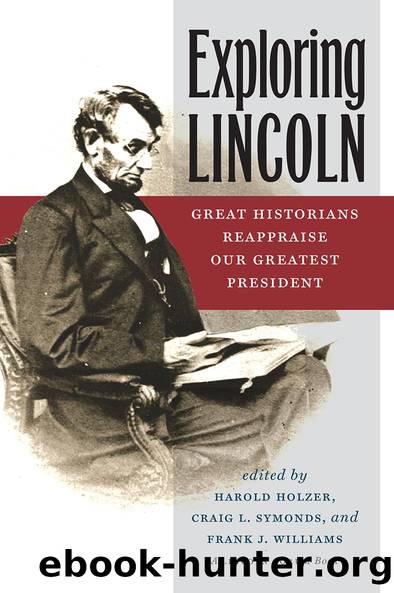Exploring Lincoln by unknow

Author:unknow
Language: eng
Format: epub
ISBN: 9780823265633
Barnesnoble:
Publisher: Fordham University Press
Published: 2015-03-02T00:00:00+00:00
Lincoln and the Struggle to End Slavery
Richard Striner
FOR A VERY LONG TIME, AMERICANS HAVE THOUGHT ABOUT Abraham Lincoln as a patriot above all else. Many see him as a quintessential âmoderateââa man who rescued our polity and saved our most precious institutions.
And there is surely much truth in this portrait. But there is quite a lot of truth left out of it. For Lincoln was more than just a patriotic Unionist, as most of his pre-presidential speeches and pronouncements (including his speeches in the Lincoln-Douglas debates and his âHouse Dividedâ speech) make abundantly clear. And his apparent moderation in the Civil War years was in some respects a disguise. Lincolnâs Unionismâtranscendental though it sometimes appearsâwas contingent on Americaâs progress in phasing out slavery. And when it came to his long-term antislavery program, this American leader was brilliant to the point of audacity.1
There was a fiery and charismatic side to this man that is long overdue for analysis. In Lincoln the United States produced an extraordinary moral strategistâboth fervent and Machiavellianâwho saved the Union by changing it.
Lincoln constantly insisted in the 1850s that America should stop the geographical expansion of slavery. This program was a very real threat to the Southern way of life, so called. For with a quarantine placed around the slavery system, the free-state majority in Congress would grow toward a supermajority. That being the case, the final triumph of the antislavery movement would be very hard for Southerners to stop: a congressional supermajority (together with a supermajority of free states) could sweep aside Southern opposition and amend the Constitution to destroy the institution of slavery altogether. Consequently, it was Lincolnâs election itselfâwith his âfree soilâ pledge to prevent any further extension of slavery to western landsâthat pushed the slave states into secession.
Lincolnâs earliest strategy for ridding the nation of slavery was incremental. âPhase Oneâ was the containment of the evil. âPhase Twoâ would be a long-term phaseout program, a concept in many ways derived from the British antislavery method of the 1830s. Lincoln also (at least until 1864) supported the principle of voluntary colonization for blacks as a way to defuse the incendiary racial issue among the electorate. What he wanted, he explained more than once, was to phase out the evil of slavery and then let the races go their separate ways in peace.
Some observers, such as Lerone Bennett Jr., have argued that Lincoln was an overt racist. They cite his emphasis on colonization and they quote certain statements that he made in the 1850sâstatements that in many ways sound like the talk of a man who harbored racial aversions.
But if Lincoln were a racist, we are left with a bit of a conundrum. For he denounced the oppression of blacks. In his famous Peoria speech of October 16, 1854, he pleaded with the whites in Illinois to acknowledge the truth that the ânegro has some natural right to himselfâ and that âthose who deny it, and make mere merchandise of him, deserve kickings, contempt, and death.
Download
This site does not store any files on its server. We only index and link to content provided by other sites. Please contact the content providers to delete copyright contents if any and email us, we'll remove relevant links or contents immediately.
The Complete Stick Figure Physics Tutorials by Allen Sarah(7369)
Secrets of Antigravity Propulsion: Tesla, UFOs, and Classified Aerospace Technology by Ph.D. Paul A. Laviolette(5370)
Thing Explainer by Randall Munroe(3932)
The River of Consciousness by Oliver Sacks(3601)
The Order of Time by Carlo Rovelli(3191)
How To by Randall Munroe(3109)
A Brief History of Time by Stephen Hawking(3023)
I Live in the Future & Here's How It Works by Nick Bilton(2996)
What If?: Serious Scientific Answers to Absurd Hypothetical Questions by Randall Munroe(2702)
The Great Unknown by Marcus du Sautoy(2693)
Midnight in Chernobyl by Adam Higginbotham(2548)
Blockchain: Ultimate Step By Step Guide To Understanding Blockchain Technology, Bitcoin Creation, and the future of Money (Novice to Expert) by Keizer Söze(2496)
Networks: An Introduction by Newman Mark(2405)
The Meaning of it All by Richard Feynman(2355)
Easy Electronics by Charles Platt(2327)
The Tao of Physics by Fritjof Capra(2273)
Midnight in Chernobyl: The Untold Story of the World's Greatest Nuclear Disaster by Adam Higginbotham(2229)
Introducing Relativity by Bruce Bassett(2121)
When by Daniel H Pink(2116)
